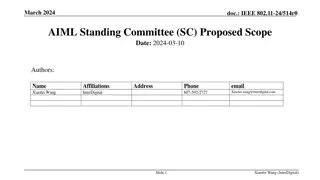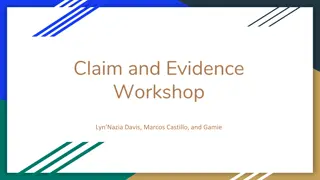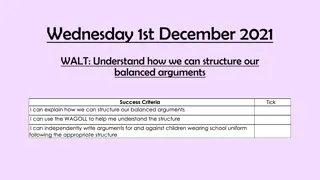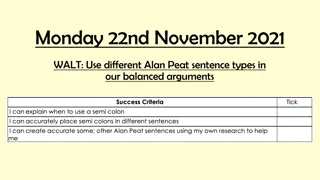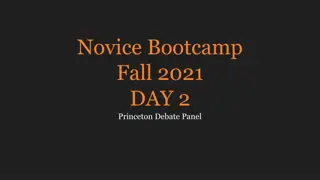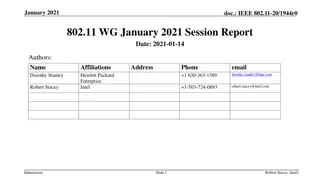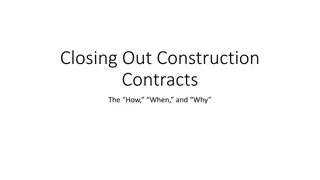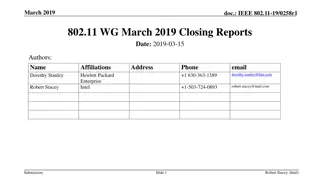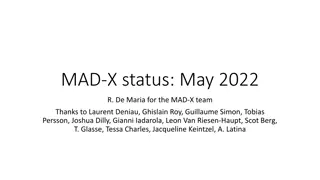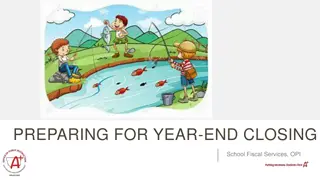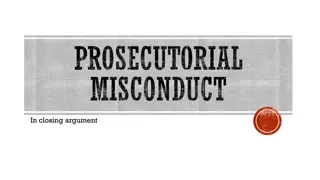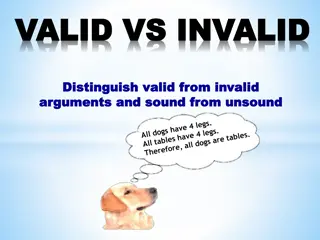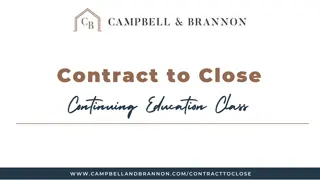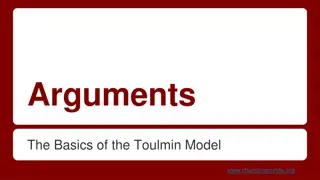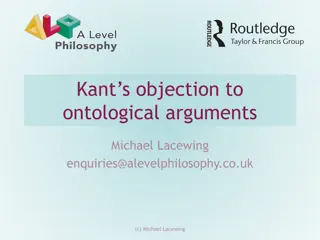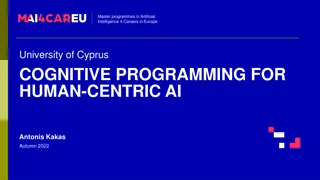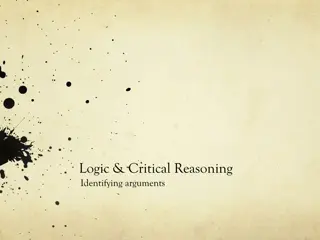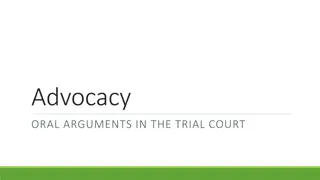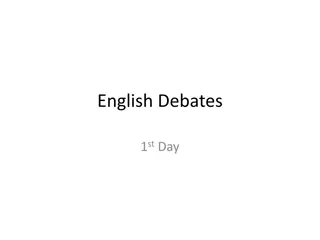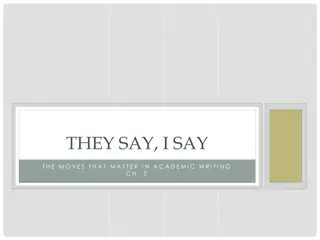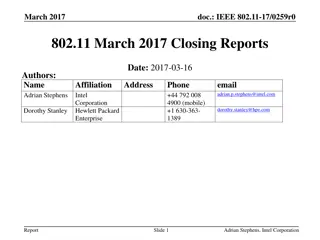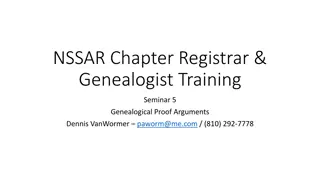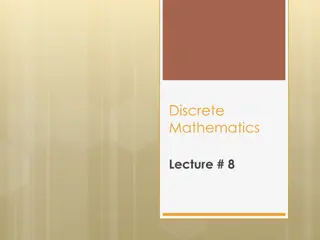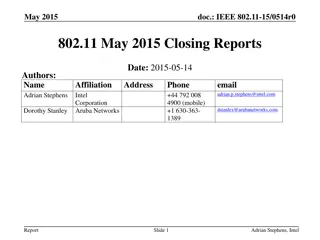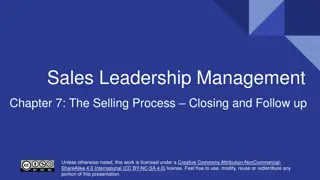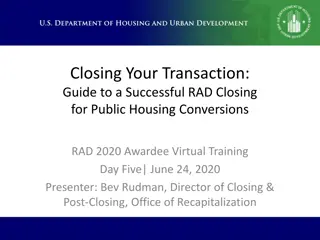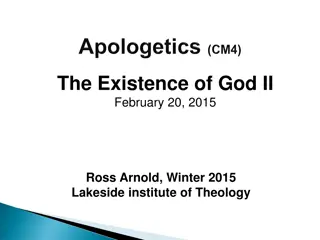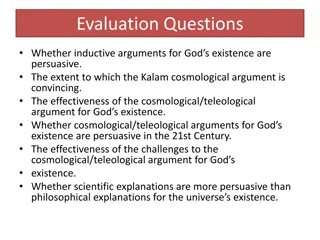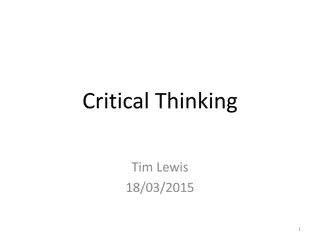REVme Closing Report - July 2023
The closing report for IEEE 802.11-23/1273r1 in July 2023 includes completion of work, plans for September, recirculation motion, conditional approval for SA Ballot, and an ad-hoc meeting authorization. Key decisions were made regarding document approvals, recirculation ballots, and SA Ballot proces
0 views • 8 slides
Sales Leadership Management
This chapter delves into the selling process by explaining the role of the seven steps involved. It covers prospecting, identifying needs and opportunities, resources for prospecting, researching prospects, and qualifying objectives. The seven-step selling process includes prospecting and qualifying
0 views • 13 slides
IEEE 802.11-24/514r0 AIML Standing Committee Scope Proposal
This document proposes the scope and closing down criteria for the formation of an Artificial Intelligence/Machine Learning (AI/ML) Standing Committee within the IEEE 802.11 organization. The proposed activities include reviewing AI/ML use cases in 802.11 systems, exploring technical feasibility, an
0 views • 5 slides
Mastering the Toulmin Method for Constructing Persuasive Arguments
Learn how to effectively structure arguments using the Toulmin Method, which consists of Claim, Data, Warrant, Backing, Counterclaim, and Rebuttal elements. Explore reasoning and logic concepts, differentiate between inductive and deductive reasoning, and understand how to construct valid arguments
0 views • 30 slides
Understanding the Structure of Balanced Arguments
Explore the concept of using the third person in writing balanced arguments to maintain objectivity and structure. Learn about third person pronouns and the importance of being unbiased in your writing. Understand the significance of structuring your arguments and maintaining a clear order for effec
0 views • 11 slides
Mastering Alan Peat's Balanced Arguments with Different Sentence Types
Explore the use of various Alan Peat sentence types in crafting balanced arguments, focusing on incorporating semi-colons effectively. Engage in interactive activities and practice sessions to enhance your skills in creating compelling arguments. Dive into examples and exercises to refine your under
1 views • 12 slides
Mastering Debate: Essential Strategies and Techniques
Learn key concepts like argument structure, points of clarification, and how to make compelling arguments in a debate setting. Discover the importance of warrants, impacts, and implications in formulating strong arguments. Explore tips on coming up with effective arguments and understanding differen
0 views • 47 slides
IEEE 802.11 Working Group Session Reports - January 2021
Digest of closing reports and liaison reports from all 802.11 sub-groups presented at the IEEE 802.11 Working Group's January 2021 closing plenary meeting. The documents include details on membership, attendance, attendees by affiliation, and subgroup attendance from November to January, as well as
2 views • 97 slides
Mastering Final Focus in Debates
Final Focus, a crucial 2-minute speech at the end of a debate, serves as your last chance to persuade the judge of your victory. It involves comparing key voters and emphasizing the impact of your arguments. Weighing key voters is essential, with a focus on demonstrating why the scale tips in your f
1 views • 4 slides
Closing Out Construction Contracts - The Process Simplified
Exploring the crucial steps involved in closing out construction contracts, this document covers the how, when, and why of the process. From substantial completion to final payment, it delves into aspects like warranty, insurance, documentation, and more, shedding light on the intricacies of wrappin
0 views • 37 slides
IEEE 802.11-19/0258r1 March 2019 Closing Reports
This document provides a digest of the closing reports from all 802.11 sub-groups for presentation at the March 2019 closing plenary meeting. It also includes liaison reports and attendance details by breakout and affiliation. Additionally, it covers the agenda for the meeting and volunteer editor c
0 views • 149 slides
Simplification of Issue Labelling and Activity Updates in MAD-X: Jan-May 2022
The MAD-X team has been actively addressing issues, closing bug reports, and merging Pull Requests to enhance their codebase from January to May 2022. The team has simplified issue labelling, closed various issues that can be addressed by pull requests, and updated their system for better efficiency
0 views • 20 slides
Understanding Reasonable Arguments vs. Pseudo-Arguments
The provided content focuses on distinguishing between reasonable arguments and pseudo-arguments through thought-provoking questions such as the ethical treatment of animals, city subsidies for sports venues, and subjective opinions on aesthetics. It also explains the structure of an argument, highl
0 views • 18 slides
Transforming Your Health: New Year, New You Review and Closing Session
Explore a comprehensive review and dynamic closing session on aspects like health screenings, physical therapy, macronutrients, mindful eating, and factors affecting metabolism. Gain insights on smart swaps in cooking and engaging discussions for success in your wellness journey. Share your learning
0 views • 9 slides
Comprehensive Guide to Year-End Closing Procedures for Colleges
Learn the essential tasks to stay on top of year-end closing processes in a college setting, including steps to take throughout the year and specific actions to tackle in June and July. From correcting errors to monitoring expenditures, this guide offers a detailed roadmap to ensure a smooth year-en
0 views • 24 slides
Year-End Closing Checklist for School Fiscal Services
Review key areas such as tax revenue, grants, grant revenue, lease rental fund revenue, accruals, deferred outflow, liabilities, and deferred inflow to properly prepare for the year-end closing in school fiscal services. Ensure accuracy in financial records and compliance with regulations for a smoo
0 views • 21 slides
Understanding Prosecutorial Misconduct in Closing Arguments
Explore the duty and obligations of prosecutors in presenting evidence fairly, the prevalence of prosecutorial misconduct, and the impact on legal proceedings. Learn about vouching, different types of prosecutorial misconduct in closing arguments, and key legal cases defining the boundaries of prose
5 views • 46 slides
Understanding Valid and Invalid Arguments in Logic
In logic, arguments consist of premises supporting a conclusion, with deductive arguments claiming logical necessity. Valid arguments have premises implying the conclusion, making them deductively valid. For example, if all actors are robots and Tom Cruise is an actor, then logically Tom Cruise must
0 views • 25 slides
An Examination of Ontological Arguments for God's Necessary Existence
Various ontological arguments, such as Malcolm's and Anselm's, propose that the existence of God is logically necessary, grounded in the concept of God as the greatest possible being. These arguments challenge the coherence of the concept of God and counter objections, like Kant's claim that existen
2 views • 10 slides
A Comprehensive Guide to Real Estate Contract Closing Process
Uncover the intricate details of the real estate contract closing process with Campbell & Brannon. Gain valuable insights into the team members' roles, procedures, and tips for a seamless closing experience. Learn about contacting team members, pre-contract considerations, red flags to watch out for
0 views • 48 slides
Procedures for Closing and Declaring Polls in an Election
Learn the steps involved in closing and declaring polls during an election, including distributing slips, closing the control unit, recording votes, sealing election papers, and delivering materials to the collection center. Follow guidelines for distributing numbered slips to voters present at clos
0 views • 38 slides
Understanding the Toulmin Model for Effective Argumentation
The Toulmin Model provides a structured approach to crafting and evaluating arguments, consisting of key components like claims, grounds/data, and warrants. It emphasizes the importance of using evidence and reasoning to support claims effectively. By understanding this model, one can enhance the pe
0 views • 13 slides
Kant's Critique of Ontological Arguments
An exploration of Kant's objection to ontological arguments, examining the flaws in the reasoning of Anselm and Descartes. Kant argues that existence is not a predicate and does not enhance the concept of a being. Therefore, ontological arguments cannot prove the existence of God solely through conc
0 views • 7 slides
Understanding Argumentation and Realization in AI Master Programmes
Exploring the concept of argumentation and its realization in artificial intelligence master programmes, focusing on the construction, evaluation, and implementation of arguments through cognitive programming. The framework involves structured argumentation, conflict relations, and strength/preferen
1 views • 31 slides
Understanding Logic and Critical Reasoning: Identifying Arguments
In the study of logic and critical reasoning, identifying arguments is a fundamental task. Arguments consist of premises supporting a conclusion, and they can be identified by specific indicators and techniques. Understanding argument structure and types of support, such as deductive and inductive,
2 views • 15 slides
Guide to Oral Arguments in Trial Court
Learn how to conduct oral arguments in a trial court, including the steps for both the movant and respondent, strategies for making strong arguments, and tips for responding effectively. This comprehensive guide covers the dos and don'ts of oral arguments, emphasizing the importance of preparation,
0 views • 9 slides
Supporters of Slavery in the 19th Century: Legal, Religious, and Economic Arguments
In the 19th century, defenders of slavery utilized legal arguments by denying citizenship rights to blacks, religious arguments by justifying ownership and guidance through biblical references, and economic arguments by comparing treatment of slaves in the South to conditions of workers in the North
0 views • 4 slides
Understanding Command-line Arguments and Errors
Learn how to utilize command-line arguments in Python scripts to enhance flexibility and parametrize functions for various inputs. Explore ways to access and utilize command-line arguments effectively, while handling errors gracefully.
0 views • 30 slides
Analyzing Arguments in English Debates: A Critical Approach
Explore and critique various arguments presented in English debates, including topics like dietary recommendations, digestion issues with Japanese rice, and driving skills in different weather conditions. Learn how to evaluate evidence, causality, and persuasiveness in arguments to develop critical
0 views • 19 slides
Mastering Academic Writing Moves: The Art of Summarizing
In academic writing, mastering the art of summarizing is crucial for persuasive arguments. By engaging in dialogue with others and summarizing their arguments, writers can strengthen their position. It is important to strike a balance between the original author's ideas and your own, emphasizing asp
0 views • 15 slides
An Overview of Debate: Propositions, Teams, and Formats
Debate is a regulated discussion between two matched sides discussing a proposition, with the affirmative arguing for change and the negative defending the status quo. The standard debate format involves constructive arguments followed by rebuttals from both sides. The roles in a debate include the
0 views • 47 slides
Summary of IEEE 802.11 March 2017 Closing Reports
This document provides a digest of the closing reports from all 802.11 sub-groups for the March 2017 closing plenary meeting. It includes attendance information, liaison reports, and data on new members and meeting revisions. The reports encompass a wide range of topics discussed during the sessions
0 views • 116 slides
Genealogical Proof Arguments and SAR Standard of Proof
This detailed content covers the definitions and components of genealogical proof arguments, proof summaries, and the SAR standard of proof. It explains the importance of evidence quality, source citations, and analysis in establishing acceptable genealogical conclusions for SAR membership applicati
0 views • 22 slides
Understanding Valid and Invalid Arguments in Discrete Mathematics
Concepts of valid and invalid arguments in discrete mathematics are explored through examples. Learn how to determine the validity of arguments based on premises and conclusions. Practice using truth tables to evaluate argument forms. Enhance your logical reasoning skills in Discrete Mathematics.
0 views • 22 slides
IEEE 802.11 May 2015 Closing Reports Summary
This document presents a digest of the closing reports from all 802.11 sub-groups for the May 2015 closing plenary meeting. It includes attendance information, liaison reports, and details on group meetings and total attendance percentages in a graphical format.
0 views • 111 slides
The Selling Process: Closing Techniques and Strategies
The chapter delves into the art of closing a sale successfully, emphasizing the importance of initiating the closing process early on in the sales journey. It discusses negotiating for mutual benefit, overcoming closing challenges, and accepting job offers effectively. The significance of follow-up
0 views • 14 slides
Guide to Successful RAD Closing for Public Housing Conversions - Training Insights
In this virtual training session, Bev Rudman, the Director of Closing & Post-Closing at the Office of Recaptitalization, shares valuable insights on ensuring a successful RAD closing for public housing conversions. Key topics covered include starting early, understanding the process, identifying pos
0 views • 19 slides
Philosophical Apologetics: Arguments for the Existence of God
Philosophical apologetics presents various arguments for the existence of God, including the ontological, cosmological, teleological, moral, transcendental, and presuppositional arguments. These arguments cover diverse aspects such as change, causality, design, contingency, miracles, consciousness,
0 views • 10 slides
Evaluating Arguments for God's Existence in the 21st Century
Exploring the persuasiveness of inductive arguments for God's existence, assessing the Kalam cosmological argument, and evaluating the effectiveness of cosmological/teleological arguments. Delving into whether scientific explanations surpass philosophical ones, the strengths and weaknesses of these
0 views • 16 slides
Understanding Critical Thinking, Hypotheses, and Arguments
Explore the concepts of critical thinking, hypotheses, and arguments in this informative content. Learn about the definition of hypotheses, the nature of arguments, and syllogisms. Delve into the world of logical reasoning and the foundations of thought processes.
0 views • 32 slides


